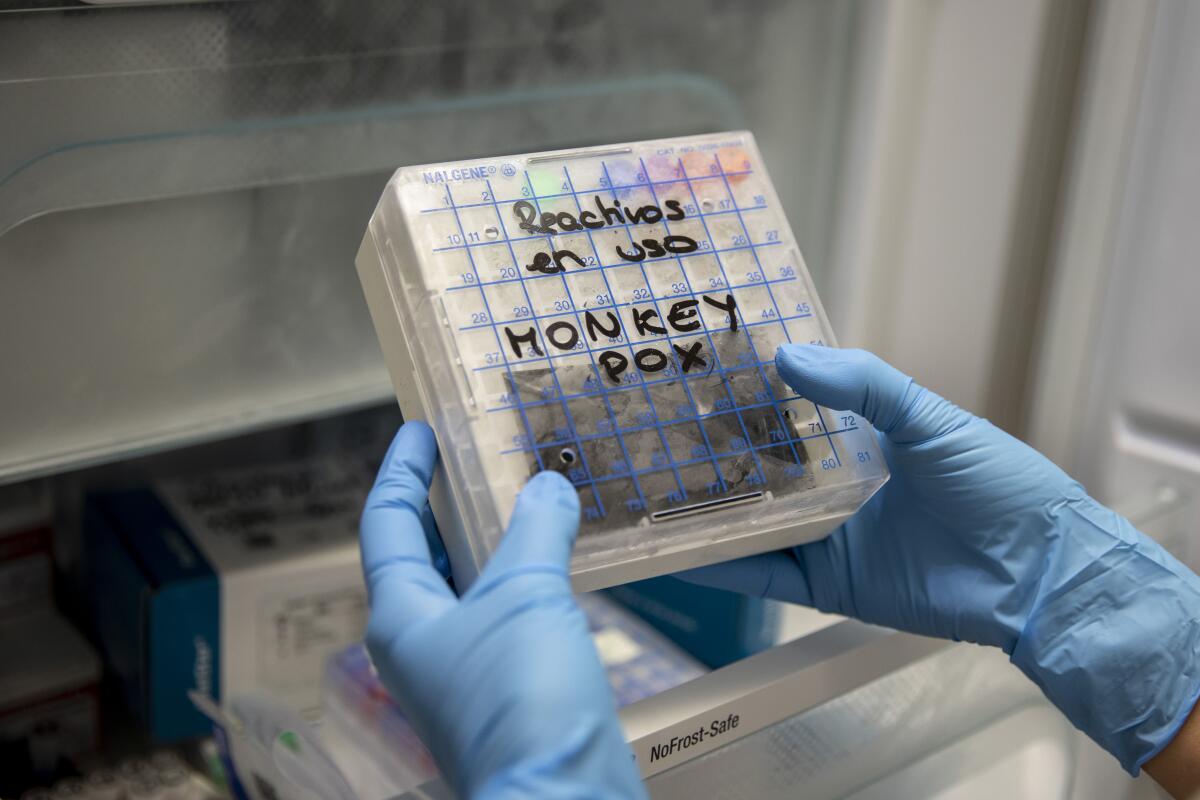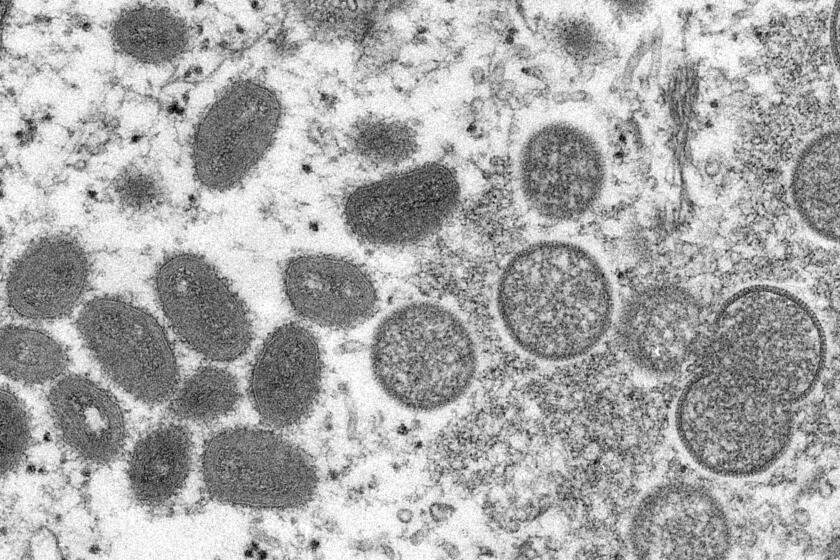First suspected cases of monkeypox in Riverside and Santa Clara counties reported

- Share via
With monkeypox cases ticking up in California, public health officials in Riverside and Santa Clara counties reported their first probable cases this week.
Health officials in Riverside County received positive test results from a man in the eastern portion of the county on Tuesday, said Jose Arballo Jr., spokesperson for Riverside University Health System-Public Health.
The man, who is under 60 years old, showed up at a clinic with symptoms and was tested, Arballo said. He did not require hospitalization and was well enough to recover at home.
The Santa Clara County patient also tested positive for monkeypox after seeking medical treatment and is now isolating.
Both individuals had recently traveled internationally, officials said.
Most of the U.S. monkeypox cases known to the Centers for Disease Control and Prevention involve people who have recently traveled or have had close contact with someone who was infected.
Officials sent the test results from the Riverside and Santa Clara cases to the CDC and were awaiting confirmation. Efforts to trace close contacts of both individuals were underway.
“Given that there have been other probable cases in the region, it is not surprising that we would have one in Riverside County,” said Dr. Geoffrey Leung, public health officer for the county.
Some experts say the WHO’s decision to act only after the disease spilled into the West could entrench the inequities that arose during the pandemic.
Since Los Angeles County reported its first case of monkeypox earlier this month, along with cases in Sacramento, which reported the state’s first, and in San Francisco and San Diego, the number of cases has continued to grow across the state.
There were 39 suspected and confirmed monkeypox cases in California, according to the most recent count by the state’s Department of Public Health. Two weeks ago, there were eight cases in the state and 40 across the United States.
The nationwide number has since grown to 156, according to the CDC.
Even so, the CDC said the threat of monkeypox to the general population in the U.S. is low since it does not spread easily between people without close contact. It is typically spread through sustained skin-to-skin contact with someone with active rashes. Unlike COVID-19, spreading through the air is not a main source of transmission for monkeypox.
Officials continued to stress awareness of the symptoms of monkeypox, such as a rash that may look like pimples or blisters that often first appears in the genital area. Other symptoms include fever, headache, muscle aches and backache, swollen lymph nodes, chills and exhaustion, the CDC said.
Health officials say they’re hoping to contain the monkeypox outbreak but say it’s possible there is already community spread of the virus.
“Gay and bisexual men are disproportionately affected by this virus in our region, and we stand together with these communities to support residents in protecting themselves and taking care of their health,” said Dr. Monika Roy, communicable disease controller and assistant health officer for Santa Clara County.
Such prevalence in early monkeypox cases has sparked concerns within LGBTQ communities internationally of potential stigmatization and blame, similar to discrimination experienced in the AIDS crisis of the 1980s and 1990s.
“It is important to note that the risk of monkeypox is not limited to men who have sex with men,” the World Health Organization said in its guidance. “Anyone who has close contact with someone who is infectious is at risk.”
But the WHO acknowledged outreach and spreading awareness to specific communities most affected by the disease is necessary.
The monkeypox variant that has been found in the majority of cases in the United States has been linked to the variant that has appeared in Europe, CDC officials had previously said.
Elsewhere in the globe, the United Kingdom reported the highest number of cases with nearly 800, while Germany and Spain had more than 500. France and Portugal each had more than 300, and Canada had at least 200 cases.
As the global case count surpassed 3,200, the WHO convened an emergency committee Thursday to consider declaring the ongoing outbreak of monkeypox a global emergency.
Doing so would mean the U.N. health agency considers the outbreak to be an “extraordinary event” and that the disease is at risk of spreading across even more borders. It would also give monkeypox the same distinction as the COVID-19 pandemic and the ongoing effort to eradicate polio.
Although Western nations such as the United States have been quick to respond to and shut down cases as they have arisen in recent weeks, countries in Africa have been experiencing outbreaks of monkeypox for decades, a fact that some experts have pointed to as examples of inequity in vaccine distribution.
The WHO is attempting to address this unequal access with a vaccine-sharing program.
The Associated Press contributed to this report.
More to Read
Sign up for Essential California
The most important California stories and recommendations in your inbox every morning.
You may occasionally receive promotional content from the Los Angeles Times.












